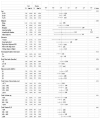The effect of calcium plus vitamin D on risk for invasive cancer: results of the Women's Health Initiative (WHI) calcium plus vitamin D randomized clinical trial
- PMID: 21774589
- PMCID: PMC3403703
- DOI: 10.1080/01635581.2011.594208
The effect of calcium plus vitamin D on risk for invasive cancer: results of the Women's Health Initiative (WHI) calcium plus vitamin D randomized clinical trial
Abstract
In the Women's Health Initiative (WHI) trial of calcium plus vitamin D (CaD), we examined the treatment effect on incidence and mortality for all invasive cancers. Postmenopausal women (N = 36,282) were randomized to 1,000 mg of elemental calcium with 400 IU vitamin D3 or placebo. Cox models estimated risk of cancer incidence and mortality. After 7.0 yr, 1,306 invasive cancers were diagnosed in the supplement and 1,333 in the placebo group [hazard ratio (HR) = 0.98; CI = 0.90, 1.05, unweighted P = 0.54]. Mortality did not differ between supplement (315, annualized% = .26) and placebo [(347, 0.28%; P = 0.17; HR = 0.90 (0.77, 1.05)]. Significant treatment interactions on incident cancer were found for family history of cancer, personal total intake of vitamin D, smoking, and WHI dietary trial randomized group. Calcium/vitamin D supplementation did not reduce invasive cancer incidence or mortality. Supplementation lowered cancer risk in the WHI healthy diet trial arm and in women without a first-degree relative with cancer. The interactions are only suggestive given multiple testing considerations. The low vitamin D dose provided, limited adherence, and lack of serum 25(OH)D values should be considered when interpreting these findings.
Conflict of interest statement
The remaining authors do not report conflicts of interest.
Figures
References
-
- International Agency for Research on Cancer: Vitamin D and Cancer. IARC Working Group Reports. Vol. 5. International Agency for Research on Cancer; Lyon, France: 2008.
-
- Wactawski-Wende J, Kotchen JM, Anderson GL, Assaf AR, Brunner RL, et al. Calcium plus vitamin D supplementation and the risk of colorectal cancer. N Engl J Med. 2006;354:684–696. - PubMed
-
- Peters U, Chatterjee N, McGlynn KA, Schoen RE, Church TR, et al. Calcium intake and colorectal adenoma in a U.S. colorectal cancer early detection program. Am J Clin Nutr. 2004;80:1358–65. - PubMed
-
- Abbas S, Linseisen J, Slanger T, Kropp S, Mutschelknauss E, et al. Serum 25-hydroxyvitamin D and risk of postmenopausal breast cancer—results of a large case-control study. Carcinogenesis. 2008;29:93–99. - PubMed
Publication types
MeSH terms
Substances
Grants and funding
- N01WH42112/WH/WHI NIH HHS/United States
- N01WH42119/WH/WHI NIH HHS/United States
- N01 WH022110/WH/WHI NIH HHS/United States
- N01WH42109/WH/WHI NIH HHS/United States
- N01WH42114/WH/WHI NIH HHS/United States
- N01WH32111/WH/WHI NIH HHS/United States
- N01WH42115/WH/WHI NIH HHS/United States
- N01WH42111/WH/WHI NIH HHS/United States
- N01WH42122/WH/WHI NIH HHS/United States
- N01WH32115/WH/WHI NIH HHS/United States
- N01WH42124/WH/WHI NIH HHS/United States
- N01WH32102/WH/WHI NIH HHS/United States
- N01WH32112/WH/WHI NIH HHS/United States
- N01WH32101/WH/WHI NIH HHS/United States
- N01 WH074314/WH/WHI NIH HHS/United States
- N01WH42221/WH/WHI NIH HHS/United States
- N01WH32119/WH/WHI NIH HHS/United States
- N01WH32105/WH/WHI NIH HHS/United States
- N01WH42132/WH/WHI NIH HHS/United States
- N01WH42121/WH/WHI NIH HHS/United States
- N01WH42113/WH/WHI NIH HHS/United States
- N01WH42125/WH/WHI NIH HHS/United States
- N01WH32106/WH/WHI NIH HHS/United States
- N01WH42129/WH/WHI NIH HHS/United States
- N01WH42108/WH/WHI NIH HHS/United States
- N01WH42118/WH/WHI NIH HHS/United States
- N01WH32113/WH/WHI NIH HHS/United States
- N01WH42120/WH/WHI NIH HHS/United States
- N01WH32118/WH/WHI NIH HHS/United States
- N01WH42131/WH/WHI NIH HHS/United States
- N01WH32122/WH/WHI NIH HHS/United States
- N01WH42107/WH/WHI NIH HHS/United States
- N01WH42117/WH/WHI NIH HHS/United States
- N01 WH074315/WH/WHI NIH HHS/United States
- N01WH42130/WH/WHI NIH HHS/United States
- N01WH32109/WH/WHI NIH HHS/United States
- N01WH32108/WH/WHI NIH HHS/United States
- N01WH32100/WH/WHI NIH HHS/United States
- N01WH42123/WH/WHI NIH HHS/United States
- N01WH24152/WH/WHI NIH HHS/United States
- N01WH42110/WH/WHI NIH HHS/United States
- N01WH42126/WH/WHI NIH HHS/United States
- N01WH42116/WH/WHI NIH HHS/United States
LinkOut - more resources
Full Text Sources
Medical
Miscellaneous

